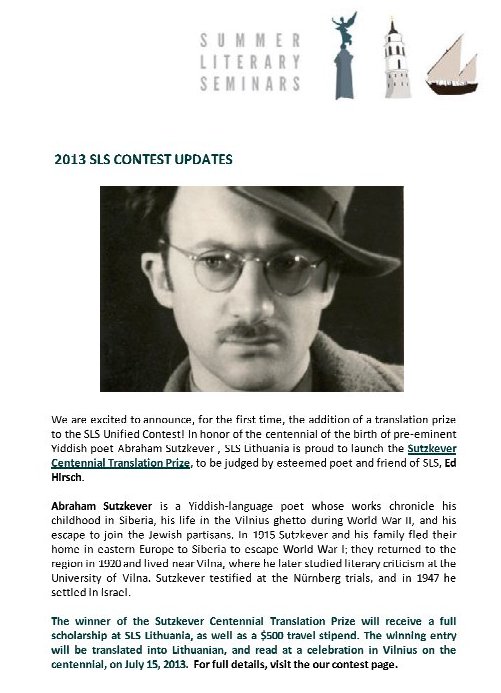O P I N I O N
Dear Mr. Hirsch,
Congratulations on your selection as judge of the new literary translation contest named for the eminent late Yiddish poet Avrom (Abraham) Sutzkever (1913-2010). News of the contest was today disseminated far and wide (information affixed below, for readers’ rapid reference, and to help inspire more entries in your competition).
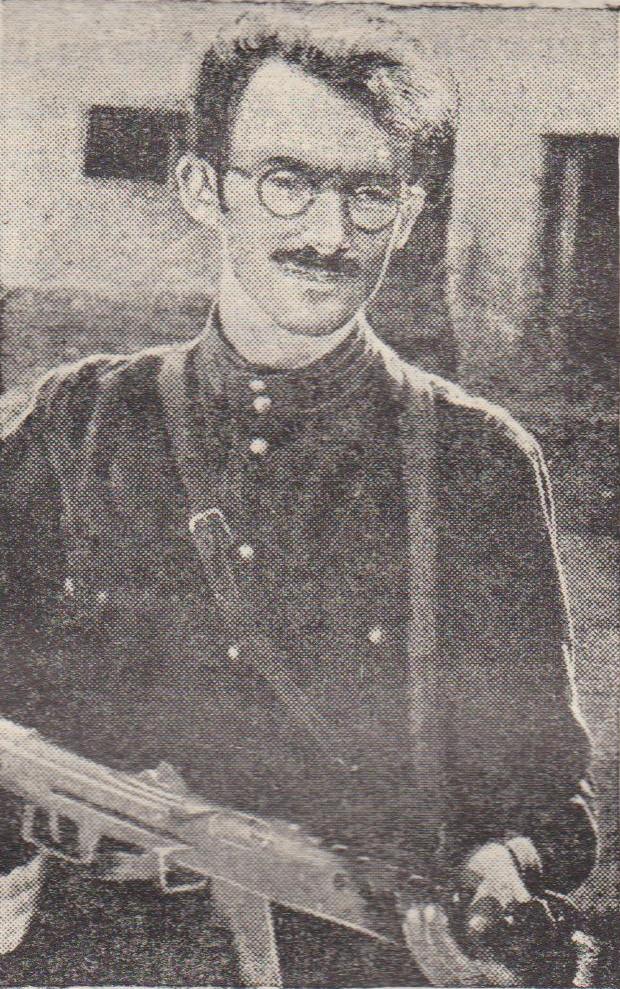
Will prosecutors (and the writers’ union) in Vilnius be told about Avrom Sutzkever’s days with the Soviet partisans?
You may know that in addition to being a major twentieth century Yiddish poet and editor, Sutzkever survived the Holocaust by escaping the Vilna Ghetto to join the anti-Nazi Jewish partisans. You may or may not know that elderly Lithuanian Jewish Holocaust survivors, who like Sutzkever escaped certain death by joining the partisans, but who are still alive and relatively well, have been defamed as “war criminals” by the same Lithuanian government that recently invested in a Sutzkever plaque in Vilnius, brought over his Israeli family for festivities, and invests in ever more Jewish and Yiddish PR stunts (complete with honors for compliant foreigners) to camouflage a campaign of revisionism.
This is on top of a disturbing toleration of serious antisemitism, including in recent years, state-sanctioned neo-Nazi marches in the heart of the capital city on independence day, the legalization of public swastikas (the UN Human Rights Committee has commented), and inaction regarding front pages of mass circulation newspapers worthy of the 1930s. The most famous examples in recent years are depictions of the Jew and the Gay controlling the world (2009), and, less than a year ago, of one of the city’s resident rabbis.
On the one hand the state campaign to rewrite history, popularly known as “Double Genocide” entails the defamation of Jewish heroes of the anti-Nazi resistance (mainly by way of publicly trumpeted “pre-trial investigations”), and on the other, state glorification of Nazi collaborators. This state financed endeavor has in 2012 included the reburial with full honors, amid glittering events, of the 1941 Nazi puppet prime minister who personally signed the orders for the Jews of Kaunas to be herded into a ghetto (see the letter from three US congressmen several months ago). Among the Lithuanian-citizen authors who have very courageously exposed these efforts in recent times are Evaldas Balčiūnas and Milan Chersonski; see also the Collaborators Glorified section).
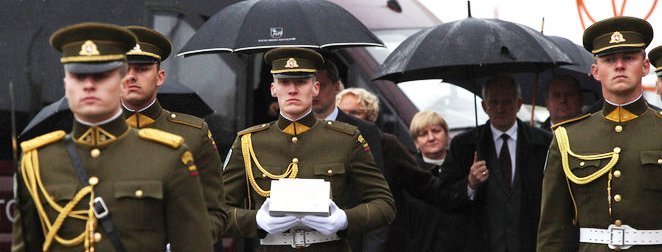
An incredible scene from 2012: An EU/NATO state’s honor guard pays homage to the 1941 Nazi puppet prime minister who personally signed one order for Jewish citizens to be sent to a concentration camp (it was actually the Seventh Fort, a mass murder site) and another requiring the Jews of his city, Kaunas, to leave their homes and move to the ghetto set up by the Nazis. The fascist PM’s remains were repatriated from Putnam, Connecticut with funding signed for by the prime minister and cultural minister. There was silence on all this in 2012 from the same Vilnius quarters working up such frenzied enthusiasm for the 2013 Sutzkever centennial festivities.
Beyond these two “symptoms” (blaming victims and honoring perpetrators), there has been the actual campaign to revise the narrative of World War II history for the entire European Union (and beyond), and locally, to criminalize the views of those who might disagree. This new far-right history revisionism, coming from a number of East European countries — not just Lithuania, of course — can be followed via its central document, the 2008 Prague Declaration. The declaration, and our modest attempt to counter it via the 2012 Seventy Years Declaration, form the backdrop to the new documentary film, Rewriting History.
◊
The last time I spoke with Sutzkever, in Tel Aviv, he and I both understood that it might be our last conversation. He asked me to promise him that I would never return to Lithuania (even as he reaffirmed that he would never return for a visit himself — “even if they give me the Nobel Prize”). This was shortly after the campaign against Jewish partisans was just starting in the Lithuanian press some years ago (and defending the country I enjoyed — and enjoy — living in, I resolutely went on to assure him that this was just a silly newspaper, and no prosecutor or politician would ever pursue such nonsense…).
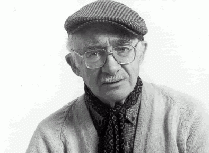
Avrom (Abraham) Sutzkever
I argued with Sutzkever, explaining my views that his advice to me was not the right way forward for me, and telling him about all the incredibly brave Lithuanians who nowadays speak up courageously against state policies, and of course, about the importance of maintaining some island of modern Yiddish culture in its homeland, for people of all backgrounds, native and visiting alike. I disagreed with my old friend and mentor. But his anger at efforts to criminalize those few ghettoized Jews who did manage to escape, by heroically fighting the Nazis, was completely understandable.
What then would Sutzkever make of this new contest in his name at a time, now near the end of 2012, when his fellow Jewish partisan veterans Dr. Yitzhak Arad (now 86), Ms. Fania Yocheles Brantsovsky (90), Dr. Rachel Margolis (91) — among others — have been smeared as war criminals? Their defamation continues as long as no public apologies are issued. An additional veteran of the anti-Nazi resistance, Tel Aviv attorney Joseph Melamed (87), was visited just over a year ago by Interpol (!) over the Lithuanian government’s claim that his 1999 book on the Holocaust “libels” Lithuanian “freedom fighters” who were implicated in mass murders of Jewish civilians during the Lithuanian Holocaust. The case of Dr. Margolis was taken up by former UK prime minister Gordon Brown. Mr. Melamed’s was brought before the British Parliament.
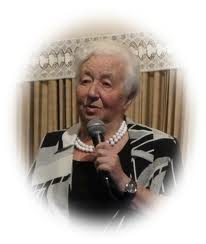
Dr. Rachel Margolis, veteran of the Jewish partisans. She worked with Avrom Sutzkever in the Vilna Ghetto. Now 91, in Rehovot, Israel, she is afraid to return to her native Vilna for one last visit because of prosecutors’ threats against her and other veterans of the Jewish partisans.
Each of these Holocaust survivor veterans of the Jewish partisans knew Sutzkever well, whether from the city, the ghetto, the forests, or the bright streets of Tel Aviv. On his recent 86th birthday, Dr. Arad completed a new paper on the Holocaust in Lithuania explaining how it has been distorted by state bodies in recent years. It was published on these pages last week. May I respectfully direct your attention to the section on why, in his view, the state’s public campaign against the Jewish partisans started in 2006? Should this campaign not be brought to a proper end before yet more literary, academic and other dignitaries from the West are abused as PR tools to cover things up with literary contests honoring a fellow Jewish partisan who was “lucky enough to get sick and die” in time to escape the prosecutors’ campaign?
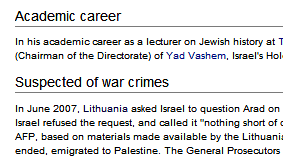
Sutzkever’s good friend and fellow veteran of the Jewish partisan resistance in Lithuania, Yitzhak Arad (known as “Tolka” in the survivor community) is smeared on Wikipedia as a result of the Lithuanian government’s (ab)use of its prosecution service and other state agencies to defame Holocaust survivors who joined the resistance. A new international petition originating in London calls on that government to issue public apologies to the accused, none of whom were ever charged with anything.
As for the ongoing effects of defamation, just look up “Yitzhak Arad” on Wikipedia. You will see the effect of state-sponsored defamation on one’s reputation. Perhaps with your literary connections, you can ensure that such defamatory materials are removed from the biographies of Holocaust survivors whose biographies mirror Abraham Sutzkever’s? Should a government be able to use its assets to smear Holocaust survivors (or anyone) in the absence of even the slightest iota of evidence against the defamed? Should it then be able to cover it all up with plaques, conferences, prizes, competitions and the like? (The politics at work here, pandering to the local far-right pro-fascist establishment and to naive foreign Jewish audiences at one and the same time, were long ago analyzed in an excellent book by N.N. Shneidman of Toronto, himself a Vilna Ghetto survivor.)
◊
The Good Lord has his own ways and means when it comes at least to timing. The announcement of your translation contest, including the important information about the winning entry’s translation into Lithuanian, arrives on our screens just as a new international petition gets underway, addressed to the Lithuanian ambassador in London, on the eve of yet another lavish PR conference. The petition, on Change.org, starts with this request to the ambassador:
1) Rapid and elegant public apologies, released prior to the conference, to the Jewish Holocaust Survivors defamed in recent years by Lithuanian prosecutors, media and some government officials. The survivors are in their late 80s and 90s, making time essential if there is going to be a symbolic amelioration in the manner in which the Lithuanian state is ending a 700 year old history of Jewish settlement, and on what note, with the last survivors of the bona fide pre Holocaust generation. Most urgently, Rachel Margolis; also: Yitzhak Arad and Fania Brantsovsky and Joseph Melamed.
In other words, as long as the accused Jewish partisans are with us, and may they live to the proverbial age of 120 years, the Lithuanian government has the opportunity to “end things on a nicer note” with the last survivors than police turning up looking for them, after a seven hundred year or so history of Lithuanian Jewry, so much of it characterized by tolerance and mutual respect.
Hoping that this is not a request you feel uncomfortable with, may I extend on behalf of the petition’s author, Ms. Monica Lowenberg of London, an invitation to you to consider signing, and to consider bringing the petition to the attention of colleagues and contestants involved in the planned Sutzkever festivities of 2013.
With every good wish from Vilnius,
Dovid Katz
